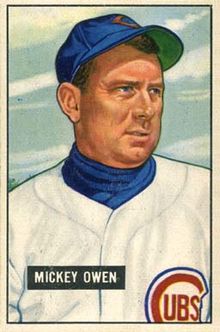Mickey Owen
| Mickey Owen | |||
|---|---|---|---|
 |
|||
| Catcher | |||
|
Born: April 4, 1916 Nixa, Missouri |
|||
|
Died: July 13, 2005 (aged 89) Mount Vernon, Missouri |
|||
|
|||
| MLB debut | |||
| May 2, 1937, for the St. Louis Cardinals | |||
| Last MLB appearance | |||
| September 11, 1954, for the Boston Red Sox | |||
| MLB statistics | |||
| Batting average | .255 | ||
| Home runs | 14 | ||
| Runs batted in | 378 | ||
| Teams | |||
| Career highlights and awards | |||
Arnold Malcolm "Mickey" Owen (April 4, 1916 – July 13, 2005) was a catcher for several Major League Baseball teams. Between 1937 and 1954, Owen played for the St. Louis Cardinals (1937–40), Brooklyn Dodgers (1941–45), Chicago Cubs (1949–51) and Boston Red Sox (1954). He batted and threw right-handed.
In a 13-season career, Owen posted a .255 batting average with 14 home runs and 378 RBI in 1209 games.
A native of Nixa, Missouri, Owen was signed by the St. Louis Cardinals in 1935. He made his major league debut in 1937, appearing in 80 games, and spent the next three full seasons in St. Louis before being traded to the Brooklyn Dodgers for catcher Gus Mancuso, a minor league player and $60,000.
From 1941 to 1944, Owen averaged 46 RBI a season for the Dodgers and played for the Brooklyn team that faced the New York Yankees in the 1941 World Series. During that championship season, he set a then-record for most consecutive errorless fielding chances by a catcher (508) and finished with a .995 fielding average. Yet ironically, Owen is most remembered in baseball lore for a costly mistake that he committed during that year's World Series. The Yankees held a 2-games-to-1 lead entering Game 4 on October 5 at the Dodgers' home field, Ebbets Field. With the Dodgers leading 4–3 and 2 outs for the Yankees in the top of the ninth inning and the count 3–2 on Tommy Henrich, Henrich swung and missed at strike 3, which would have been the final out of the game, but the ball eluded Owen and went to the backstop, allowing Henrich to make it safely to first base. The Yankees then rallied and scored four runs in the remainder of the inning and won the game 7–4. Instead of the series being tied, the victory gave the Yankees a 3–1 lead. The next day, they beat the Dodgers 3–1 in Game 5 and won the World Championship. The Dodgers didn’t return to the World Series until 1947 and didn’t win the series until 1955.
...
Wikipedia
